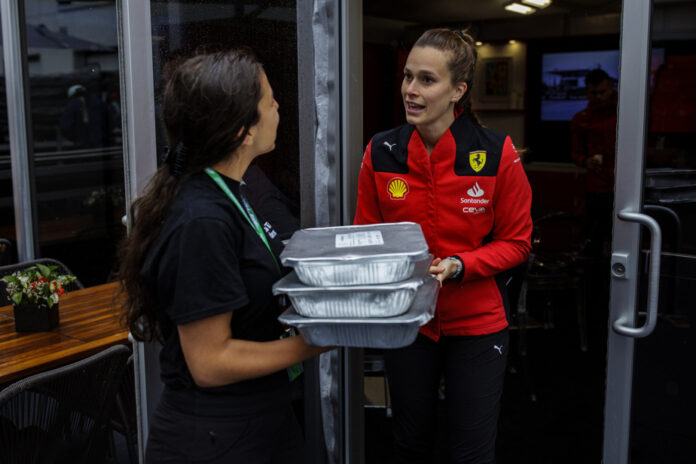The Tablée des Chefs squad must visit four stables on Saturday morning in the paddock of the Gilles-Villeneuve circuit. First stop: Red Bull, where a cook hands over four trays of food and cans of Red Bull. “Today they are dragon fruit flavored!” he exclaims with a smile.
” There is everything ! launches Calila Tardif, coordinator of the Educate and Nourish programs at the Tablée des chefs, to La Presse. We saw risotto, mashed potatoes with wasabi, parmigiana meat, it’s very varied. It’s very good quality, everything is fresh. »
Once their morning rounds are over, the squad drags their cart into a small room, where two large refrigerators are installed. The food is stored there, before being moved to another refrigerator, on the other side of the paddock. The five organizations designated this weekend – Shelter of Hope, Community Provisions, Old Brewery Mission, Salvation Army and Welcome Hall Mission – pick up surpluses during the day.
“[At agencies], it’s so appreciated! There are many needs. They distribute them very quickly. »
In other Grand Prix around the world, the surpluses are harvested on Sunday only, at the very end of the event. As the Tablée des Chefs organizes everything in advance, a few months before the Grand Prix, it collects food throughout the weekend. She thus recovers “a lot more”, according to Calila Tardif.
Last year, when the squad was first ‘edited’, F1 teams weren’t used to this way of doing things, but that didn’t stop them from recovering in large quantities.
“I think we [will get] even more this year because they are even better prepared and they collaborate even more. Everyone is looking to optimize surplus recovery. »
We quickly notice this enthusiasm by accompanying the squad during its harvest. Wherever they go, the three women are greeted with a smile. We offer them a drink, we thank them.
La Tablée des chefs also recovers surpluses elsewhere on the Gilles-Villeneuve circuit, for example in the lodges, where the food is prepared by the Queen Elizabeth Caterer, who is “already a year-round donor”. Teams will also be deployed to food concessions to see if any of them wish to return their surpluses.
The idea, agrees Ms. Tardif, would be to repeat the operation every year.
“We look at it annually, but the Grand Prix appreciates what we do, they know it helps the local community. »
“Ideally, you wouldn’t want to have that program, because [it would mean] there would be no food insecurity or waste,” she says. But there will always be surpluses. »
As well, therefore, recover them as much as possible and use them wisely.















